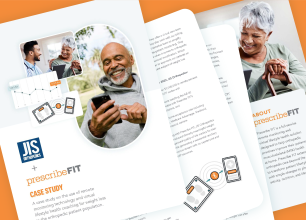As an orthopedic provider, you recognize the undeniable correlation between your patients’ weight and their musculoskeletal (MSK) pain. You know that it must be part of the conversation as you treat them. But how do you go about beginning to discuss it with them?
A study of the relationship between overweight patients and providers revealed that patients who perceived a sense of judgment from their provider related to their weight were significantly less likely to trust them. Their fears are not necessarily unwarranted, as weight bias and stigma are prevalent in the healthcare industry and are known to sometimes result in treatment inequity. For some overweight patients, seeking medical care can be an anxiety-inducing experience.
As their trusted provider, you have the responsibility to discuss weight with your obese and overweight patients. It simply cannot be avoided in the orthopedic space. Prescribe FIT partners with orthopedic providers to help patients with MSK pain make sustainable lifestyle changes that can reduce their pain. Over the course of our orthopedic-optimized lifestyle health coaching program, we talk about weight loss often. Ensuring that our patients feel safe and supported — and motivated to make the changes their bodies need — starts with gaining a deeper understanding of their challenges.
Here’s out one of our partner physicians, Dr. Pete Edwards, presents weight loss as one of four possible treatment paths for a patient’s orthopedic issues: Watch the video
The following is a talk track we call the “4 Treatment Paths” that was designed to help facilitate the conversation in-office with your patients.
“At our practice we care about your overall health, not just your knee/hip/shoulder/etc. There are four treatment path options we can discuss to reduce or eliminate your pain or orthopedic concern.
(1) Surgery is one option, but we can’t and shouldn’t always start there. We can also consider (2) physical therapy, (3) injections and medication.. (4) or making healthy lifestyle modifications to decrease inflammation in the body and weight on the joints.
We partner with a company called Prescribe FIT to offer a healthy lifestyle coaching program that is personalized to you. You will be matched with a health coach, download an app, and receive a scale that sends weigh-ins to the app. You will be matched with a certified Health Coach who will be your support system and expert guide on your journey to a more pain free life. Assisted by a mobile app and digital scale, your Health Coach will teach you how to improve your lifestyle by increasing your activity, eating right to fuel your health, and more during the program. The program is covered by most insurance.
Here’s a brochure with information. Our Clinical Assistant will help get you referred today and Prescribe FIT will be in touch within 48 to 72 hours to answer all of your questions.”
While it’s just the beginning of the conversation, it’s important to help patients understand that surgery may not be the fix-all they’re hoping for if it isn’t supported by their habits and lifestyle.
Generic advice is rarely conducive to positive outcomes, and research shows that generic advice typically does not help patients lose weight. But through an empathetic, lifestyle-health approach based in scientifically-verified, root-cause medicine, we can turn the tide on the Orthobesity™ epidemic starting with orthopedic care.
The Orthobesity™ Epidemic in America
Obesity is an epidemic in the United States, with an estimated 40% of adults in the U.S. classified as obese. The CDC defines obesity as a chronic disease, and as such, it requires treatment and preventative measures just like any other disease. However, weight loss has become somewhat of an industry in itself that lives outside of clinics and certified healthcare settings. This has led to damaging misinformation and fads that rarely address the actual cause of the obesity epidemic.
While genetics do play a role in how an individual carries weight, the causes of obesity are often social and behavioral. The obesity epidemic is deeply tied to restricted access to nutritious food, lack of societal support systems and other socio-economic factors. On a more anecdotal level, we have found that many of the orthopedic patients we work with also lack an understanding of how the food they put in their body and the physical activity they do affects their health.
In the orthopedic space, that correlation is starkly evident. The number of orthopedic patients seeking surgical intervention for MSK issues that are caused, or exacerbated, by obesity is on the rise. We coined the term Orthobesity™ to describe that phenomenon. Because obesity is inextricably linked with MSK and joint pain, orthopedic providers have the opportunity to take back the subject of obesity.
Utilizing RPM & Connected Care Interventions for Weight Loss
The healthcare industry is changing rapidly, and orthopedic providers everywhere are affected by it. The meteoric rise of telehealth during the COVID-19 pandemic opened new channels for care, and patients across the country responded positively to it. Telehealth is part of the answer to the growing trend toward more personalized, value-based care offerings and a population health approach.
Today’s patients want:
- Proactive, preventative care
- Personalized treatment plans
- Easier access to medical care
Remote patient monitoring (RPM) technology offers just that.
RPM is a powerful tool for patient compliance, especially when it comes to weight reduction. Through RPM, Prescribe FIT helps bridge the gap between patients and providers outside of the clinic. We integrate into your practice as a billable and reimbursable option for your patients. Our lifestyle health program is 100% virtual with physician supervision. The combination gives patients the more personalized experience they crave while also enabling providers to influence better results pre- and post-orthopedic surgery — including through guided weight loss.
Our certified Health Coaches work with you to understand the specific goals you have for your patients and then take the lead on helping your patients undergo necessary lifestyle changes. We educate patients about nutrition, activity and habits, and work with them to create sustainable improvements in those areas. Our goal is your goal: help patients reduce their MSK and joint pain.
One of the most important (and effective) things we do over the course of our program is help patients understand why their doctor has prescribed weight loss. We never want a patient to feel blamed or judged. Instead, we help illustrate how losing weight can positively impact their health. We talk about things like:
- Improving surgical outcomes & recovery
- Extending the life of your new joint
- Lowering the stress on joints and muscles
- Preventing future injuries
- The chance to live longer and with less pain
And that’s not to mention the other non-scale victories we often see associated with weight loss, such as increased energy and greater confidence.
Through remote patient monitoring technology, we can be the support system many patients need during their weight loss journey. We help put your treatment plan and advice right in their home and make it easier for them to access helpful resources. Instead of prescribing weight loss and hoping your patients follow through, we can help facilitate greater transparency into your patients’ progress, allowing you to continue customizing their treatment plan along the way. And instead of turning to fad diets or other damaging weight loss trends, your patients gain unprecedented access to their care team and a sustainable, healthy plan.
Simply telling a patient, “Go lose weight,” is rarely going to be effective. But taking the time to educate them on why you want them to and how to do it the right way can be life changing. Whether you engage our program to help break through to patients or you start those conversations yourself, approaching the conversation with kindness and empathy is key to unlocking patient compliance.
Get in touch to learn more about our physician monitored weight loss program.
Published on June 11, 2024

